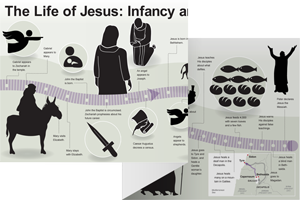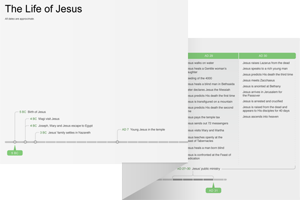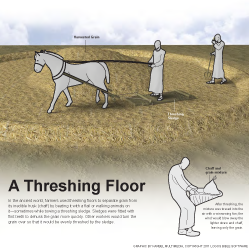3:1–12 Matthew introduces the life and preaching of John the Baptist. John served as a forerunner to Jesus, proclaiming the advent of the kingdom and the arrival of the Messiah. |
3:1 in those days This phrase serves to anchor Matthew’s narrative in Scripture. The ot prophets often use this phrase to describe the time of fulfilled prophecy.
John the Baptist A prophet who is both a fulfillment of ot prophecies and a model of the ot prophets themselves (see Matt 11:13–14; 16:14; 17:10–13; Mal 4:5). Malachi 4:5 speaks of the one who will precede the Messiah, a reference later applied to John by Jesus (Matt 11:14; 16:14). See note on John 1:6.
preaching The Greek word used here, kēryssō, denotes official or public proclamation.
the Judean wilderness Robbers, displaced peasants, and religious ascetics often sought refuge in the wilderness. John’s way of life resembles that of wilderness ascetics. Concerned about self-denial, spiritual discipline, and devotion to the law, ascetic men and women went to the wilderness in order to distance themselves from the evils of society (compare note on Mark 1:4).
3:2 Repent A decision to turn away from sin and toward God’s ways.
has come near The Greek term used here, engizō, means “to come or be near” in the sense of “impending”—too close (and coming closer) to be ignored.
kingdom of heaven Synonymous with “kingdom of God.” Both expressions refer to the time when God’s rule would be enacted on earth as it is in heaven. Biblical writers often used “heaven” as a way of referring to God and His abode without having to use the divine name (Yahweh). See note on Mark 1:15.
3:3 by the prophet Isaiah Another fulfillment of ot prophecy. Unlike Mark, Matthew does not include a quotation from Mal 3:1.
 Jesus’ Fulfillment of Old Testament Prophecy Table
Jesus’ Fulfillment of Old Testament Prophecy Table
of one crying out in the wilderness Matthew cites Isa 40:3 from the Septuagint (the Greek translation of the ot).
Prepare the way of the Lord In Isaiah 40:3, this prophecy refers to the Lord’s restoration of His people to their land following the exile. Later, it became part of messianic expectations. Both uses involve restoration and reconciliation. Matthew appropriates this prophecy in reference to Jesus, who now comes to lead His people out of sin. The command is a direct message of repentance.
3:4 clothing made from camel’s hair Matthew has already shown how John fulfills Isa 40:3; this description portrays John as the new Elijah (compare 2 Kgs 1:8).
his food was locusts and wild honey Locusts were common food in the Middle East. Leviticus 11:20–23 identifies four varieties that are clean
were common food in the Middle East. Leviticus 11:20–23 identifies four varieties that are clean and good to eat.
and good to eat.
3:5 were going out To the wilderness to be baptized.
3:6 they were being baptized Likely derived from the Jewish custom of ritual washings. Jewish baptisms were intended to signify spiritual cleansing; John’s baptisms are depicted as preparations for the coming of the Messiah.
were intended to signify spiritual cleansing; John’s baptisms are depicted as preparations for the coming of the Messiah.
Jordan River The Jordan was significant because it served as the border that Israel crossed to enter the promised land (e.g., Deut 9:1). It does not seem to have been important for ritual washings (except in the case of Naaman; 2 Kgs 5:10, 12).
was significant because it served as the border that Israel crossed to enter the promised land (e.g., Deut 9:1). It does not seem to have been important for ritual washings (except in the case of Naaman; 2 Kgs 5:10, 12).
3:7 Pharisees and Sadducees These groups were opposed to each other but appear united in their opposition to John. Matthew highlights the Pharisees and Sadducees
and Sadducees because of their importance and their later enmity toward Jesus. See note on John 1:24; note on Mark 12:18.
because of their importance and their later enmity toward Jesus. See note on John 1:24; note on Mark 12:18.
 Major Groups in Jesus’ Time Table
Major Groups in Jesus’ Time Table
coming to his baptism Implies that the Pharisees (see John 1:24 and note) and Sadducees
(see John 1:24 and note) and Sadducees (see Mark 12:18 and note) were not merely coming to look; they were coming to participate. They might have thought that they were righteous enough to qualify for baptism without prior repentance. Alternatively, each group may have come to test John’s loyalties and to see whether he would baptize them; he didn’t, which angered them.
(see Mark 12:18 and note) were not merely coming to look; they were coming to participate. They might have thought that they were righteous enough to qualify for baptism without prior repentance. Alternatively, each group may have come to test John’s loyalties and to see whether he would baptize them; he didn’t, which angered them.
Offspring of vipers This phrase could be a generic insult; it also might allude to the Jewish leaders’ cunning. Later in Matthew, Jesus uses this expression (Matt 12:34; 23:33).
Who warned you to flee from the coming wrath This question is ironic, since they did not consider themselves guilty or in need of repentance. John is asserting that their hypocrisy puts them in danger of judgment.
3:8 fruit worthy of repentance Refers to deeds that show true contrition.
3:9 We have Abraham as father See note on Luke 3:8.
from these stones See note on Luke 3:8.
3:10 the ax is positioned at the root of the trees An image of impending judgment (compare Matt 7:17–20). It builds on the ot metaphors of a tree as a person (Psa 1:3; Jer 17:8) and of fruit as deeds (Jer 24:2).
fire A symbol of divine wrath. See note on Luke 3:9.
3:11 more powerful See note on Luke 3:16.
sandals I am not worthy to carry See note on Luke 3:16.
baptize you with the Holy Spirit and fire See note on Luke 3:16.
3:12 winnowing See note on Ruth 3:2. This image shows that there is nothing arbitrary about judgment: The good, solid grain falls to the threshing floor, while the dry, empty chaff is blown away (see Isa 64:6; compare John 12:47–48).
unquenchable fire This seems to be an allusion to Isa 66:24 (see note on Isa 66:24). This idea was further developed in extrabiblical literature (e.g., Judith 16:17 and 1 Enoch 10:13).
3:13–17 Jesus comes from Galilee to be baptized by John (compare Matt 2:22). At first John refuses, but Jesus convinces him that it is necessary. After Jesus comes up out of the water, a voice from heaven and a manifestation of the Spirit |
3:14 I need to be baptized by you The first recorded public encounter between John and Jesus. John—recognizing the more powerful one (v. 11)—attempts to dissuade Jesus from being baptized.
3:15 now The Greek word arti used here means “at once” or “immediately.” John did not want to baptize Jesus, but Jesus wanted him to do so without delay.
to fulfill all righteousness John’s baptism for repentance was a means of identification with the kingdom of God. Although Jesus—the sinless Son of God—had nothing for which to repent, He publicly identified with God’s kingdom through His baptism.
Then he permitted him John, in his role as a prophet, has been accepting or rejecting people seeking baptism. Here the roles are reversed for the first time. John only dares to baptize Jesus because Jesus commands him to do so.
3:16 immediately The Greek word euthys (together with the related form eutheōs) is common in Matthew (and more common in Mark). The term conveys a sense of urgency or immediacy.
 Eutheōs Word Study
Eutheōs Word Study
the heavens opened A standard prophetic image (e.g., Ezek 1:1).
he saw The referent of “he” is unclear. Here and in Mark, it seems to refer to Jesus. Luke 3:21 may imply that the Holy Spirit was visible to everyone present, but John 1:32 indicates that John the Baptist witnessed the Spirit.
the spirit of God descending The appearance of the Spirit (pneuma) and the subsequent voice of God places Jesus in the divine presence for the commissioning of His ministry. This conforms to how true prophetic figures were commissioned by God in the ot.
 Prophetic Commissioning and the Divine Presence
Prophetic Commissioning and the Divine Presence
 Pneuma Word Study
Pneuma Word Study
like a dove Luke also uses dove imagery (Luke 3:22), but neither Matthew nor Luke describes the details of this event.
imagery (Luke 3:22), but neither Matthew nor Luke describes the details of this event.
3:17 a voice from heaven Jews of this time expected that the Messiah would demonstrate signs from heaven. Here, an actual voice from heaven is the sign. It is unclear whether all or only some of those present heard this voice, or whether anyone recognized it (compare John 12:28–29). Regardless, it announces and affirms Jesus’ identity. A voice speaks the same words at Jesus’ transfiguration (Matt 17:5).
This is my beloved Son Similar to Psa 2:7; see note on Mark 1:11.
with whom I am well pleased Similar to the description of the Suffering Servant in Isa 42:1, which Jesus quotes in Matt 12:18.

|
About Faithlife Study BibleFaithlife Study Bible (FSB) is your guide to the ancient world of the Old and New Testaments, with study notes and articles that draw from a wide range of academic research. FSB helps you learn how to think about interpretation methods and issues so that you can gain a deeper understanding of the text. |
| Copyright |
Copyright 2012 Logos Bible Software. |
| Support Info | fsb |
 Loading…
Loading…





